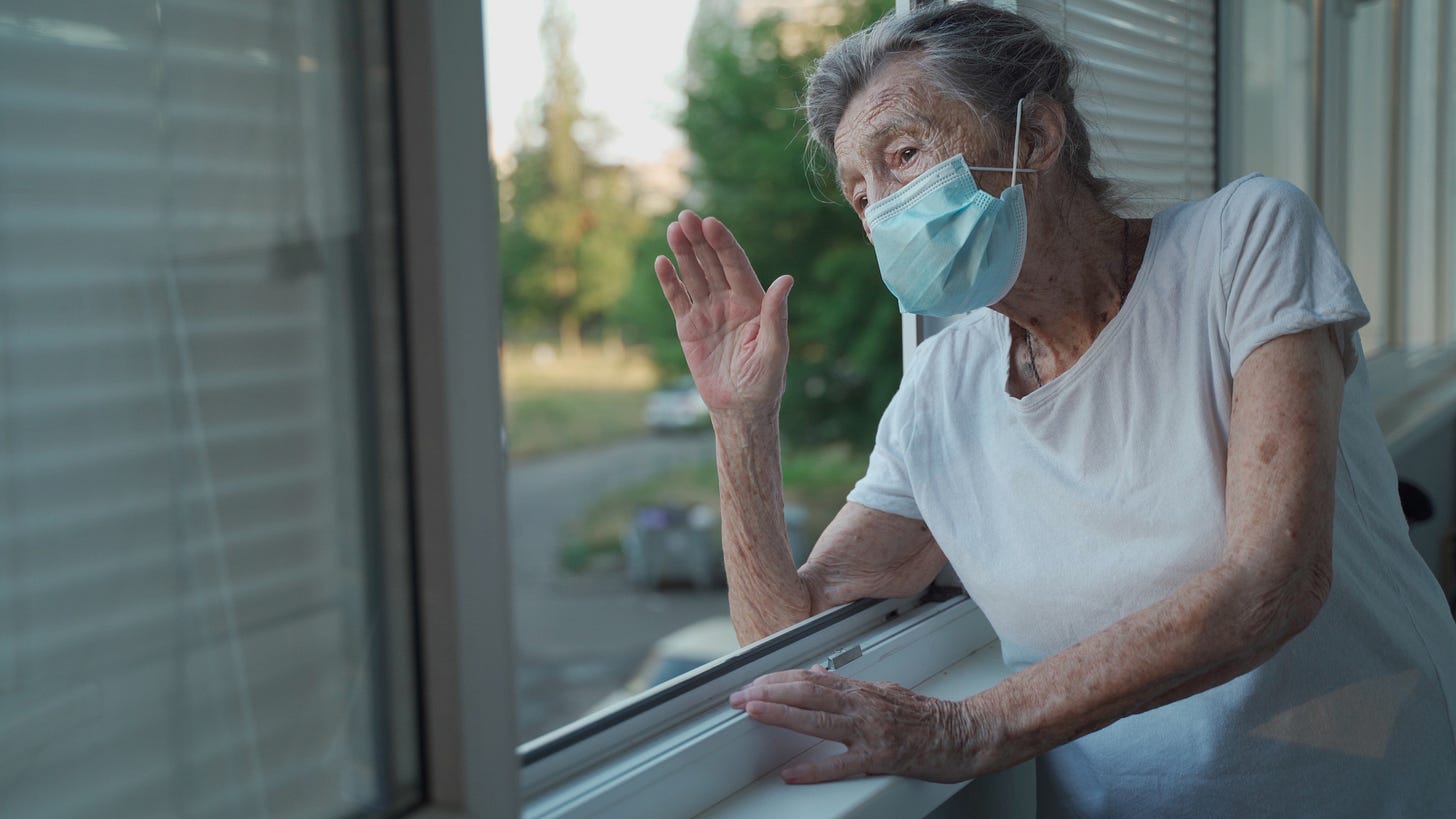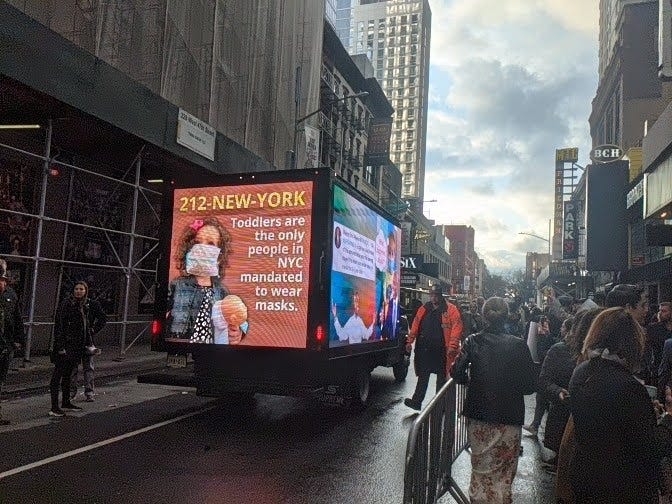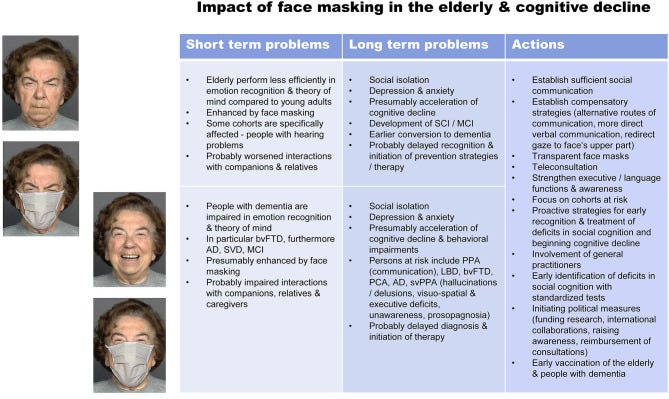We Need an "Urgency of Normal" for Nursing Homes
Elderly & children have suffered disproportionately during Covid
Happy Monday! It is a special privilege to introduce our good friend “GeroDoc” a lone voice in the Twitterverse advocating for a return to normal for long term care residents. We first “met” several months ago and bonded over our concern that the most vulnerable- the young and old- were being done a disservice by the very policies that purported to protect them. Masks, distancing, and myriad rules that forced isolation and restricted joy and community.
Things are finally improving, but not as quickly as we would like, and certainly for the elderly, time is increasingly precious. Here Gerodoc explains why we must make haste.
I have worked in long-term care (LTC) for around two decades. I have worked among and with nursing staff and residents, cared for older adults, worked with their families, gotten to know all of them as people. I not only care about keeping my older adult residents in good health, I care about them as *whole* *people,* I care about all of their needs.
Now that we're in the fourth year of the seemingly never-ending pandemic and "COVID emergency" I think it's high time we start an "Urgency of Normal" campaign for long-term care, very similarly to the one that was successfully mounted for U.S. schoolchildren many months back by tireless physician-scientist advocates like Tracy Beth Høeg, Scott Balsitis, and Lucy McBride.
I want to talk about why I feel that the plight of older adults and children in this pandemic has been similar, and why we must have the same "urgency" in bringing normality to the life of the over one million residents, according to 2019 data by Consumer Affairs, currently living in long-term care homes in the United States.
Twin Burdens of Schoolkids and Nursing Home Residents
Both nursing home residents and schoolchildren have suffered disproportionately during the COVID pandemic:
Schools in many localities / states were closed for months, many for over a year or more. Children were forced to do "Zoom school," which in the end turned out to be a shockingly poor substitute for the real thing, and for preschoolers and kindergarteners bordered on abject cruelty. At this point, the consensus seems to be that schools never should have closed for even close to as long as they did (perhaps only during severe outbreaks).
Older adults in nursing homes found their homes closed to visitors, including family, and in many cases to outside specialist provider visits for months, many for over a year.
Nursing home patients were forced to contend with cruel substitutes for in-person contact featuring prison-like window visits and absurdities like bedridden, cognitively-impaired octogenarians seeing consulting psychologists via Zoom on tablets, or over telephones held to their ears. This kind of treatment was a cruel joke on the elderly — and for the consultants who were forced to care for residents it was a grave source of moral injury.
“It’s just a mask.”
Children were forced to mask for months, along with their teachers (but not politicians - see above). For small children in kindergarten & preschool, this was undoubtedly harmful - despite the shocking, amoral denials of the American Academy of Pediatrics.
I'm reminded of everyone's favorite condescending, left-wing TV and Twitter doctor, Jonathan Reiner.


I mean, right? It's just a mask. This is just 'one little thing' that you can do to prevent the spread of COVID, flu, colds, RSV, monkeypox, and just about any communicable disease you can think of, and more importantly, "show you care."
And the moment we raise our hands to say "um, but you're pretending these things come without cost,” we get slapped down.
"There's no evidence masking harms kids."
For kids, we're told the following by the "experts" on child development, the American Academy of Pediatrics tweeted this on August 26th, 2022:

Obviously, regarding the point about visually impaired children - this directly contradicts what's commonly known about blind children - they are slower to acquire words and concepts than sighted children. This makes obvious, intuitive sense as well – when your mouth is muffled, it's more difficult to make out words and discern prosody, the tonal, musical quality of speech, than it is when unmasked. Moreover – it also makes intuitive sense that seeing mouths as people speak assists the listener.
While all of this masking stuff and its effects on language seems clearly troublesome for casual, everyday adult maskers, it's potentially deleterious for the very young first learning to speak.
But let's give the the AAP a break on this. Sure, technically what they are saying is true: there is no direct evidence that constantly masking caregivers and kids for hours a day, months (if not years) over time can harm kids' language development.
Guess why? Well - this gets to how funded scientific research happens.
The first thing that happens is a researcher creates a research proposal, and before they even get the research started, they are required to take it to something called an Institutional Review Board (IRB), commonly known as a research ethics committee.
I've served on one of these boards before, and I've submitted research proposals to them a number of times.
What that committee does is make sure you're not overtly torturing subjects, or defrauding them, or otherwise harming them (these IRBs were created in part to address the horrific torture and abuse of people by scientists under the Nazi era).
Dr. Josef Mengele is one of the most infamous of Nazi doctors who specialized in torturing concentration camp patients in the name of science. The horrors wrought by doctors like him were a very big reason why IRBs were created.
Imagine going to an IRB anytime prior to 2019 and proposing to them: "hey, I have this study I'd like to conduct. I'd like to take entire classrooms of children and then force them and their caregivers to wear masks for hours a day, five days a week, for months at a time."
No IRB would ever approve such a study!
With older adults, the situation is different, but no less horrifying. While *technically* there is no direct evidence that masking residents and their caregivers in long term care is harmful, it would also have been considered monstrous to do such an experiment prior to 2019, so to my knowledge, no research has been done.
Masking w/ Older Adults in Nursing Homes: Isolation leads to Potential Depression
There are serious concerns about the practice of “universal masking” in long-term care, particularly the prolonged nature of it at many nursing homes in the United States. Where I work, caregivers have not been unmasked for the last three years and counting.
In Schroeter, Kynast, Villringer & Baron-Cohen's 2021 peer-reviewed article in Perspective the authors who are neurologists, psychiatrists, and neuropsychologists, sketch out a variety of ways that masks can harm older adults. I summarize their concerns here:
Older adults depend far more on “face reading” (the mouth in particular) to aid in receptive speech. By mandating that healthcare professionals covering the lower halves of their faces, residents are more likely to be confused and not understand what is said.
Related to the above, older adults with dementia are often in the process of losing the ability to understand receptive speech. By covering up the facial cues that provide emotional context to speech, dementia patients become more likely to be confused as well.
Older adults, particularly those in nursing homes, have high rates of hearing loss. Without access to lip reading and “face reading,” they are worse off than before, confused by speech and isolated, as above.
All of these above problems, as the authors note, potentially increase the risk of depression in older adult long term care residents.
It's not hard to imagine why.
Masks are isolating - they reduce communication and connection. For older adults in long-term care, the connection with caregivers is the last thing they have, really, since over the last few years family visits have been so few and far between. And there's a long body of literature noting that depression in older adults is strongly associated with functional decline, exactly the thing that LTC is designed to prevent. For people who work in LTC as a profession, nurses, doctors, etc., this is a potential source of moral injury.
Masking In Children (and Locking them Down): Part of the Youth Mental Health Crisis?
Now, I work in LTC as a clinical mental health professional, with my expertise being in geriatrics – older adults. I can't comment directly on what's been driving the “mental health crisis” in children that's been of such a concern over the last year or so.

But I have to wonder whether forcing children into masks, telling them if they don't wear masks they may “kill grandma,” telling them they are “petri dishes” and “disease spreaders” - shutting down their schools for a year or more – is this driving the mental health crisis in kids?
You decide.
As you can see – the misfortunes of schoolchildren and older adults in nursing homes and facility-based care are related.
That’s why an #UrgencyOfNormal for nursing homes and long-term care is long overdue.









